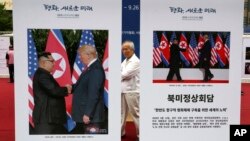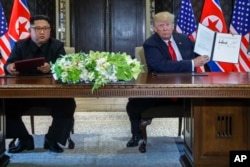U.S. Secretary of State Mike Pompeo will travel to Asia Saturday and will meet with North Korean leader Kim Jong Un on Sunday, as the pair begin making arrangements for a second summit between the United States and North Korea. While Washington had forecasted the trip for some time, it comes days after Seoul acknowledged Pyongyang may have stockpiled as many as 60 nuclear weapons. The task of setting up a framework for denuclearization discussions may prove difficult.
One year into North Korea’s outreach to the world, there’s been a growing number of nations calling for Pyongyang to receive some sanctions relief as a positive incentive for its behavior, said Evan Rees, Asia Pacific analyst at Stratfor.
“The U.S. has really gotten to the point where the maximum pressure front is getting increasingly hard to maintain, especially in the face of pressure from China and Russia,” said Rees.
WATCH: Pompeo Faces Challenges Setting Up Second Trump, Kim Summit
Beijing and Moscow called on the United Nations Security Council to re-evaluate sanctions last month. Chinese Foreign Minister Wang Yi said the warmer ties and "positive developments" between North and South Korea, as well as better relations with the United States, should lead to sanctions relief.
Washington disagrees, saying economic sanctions against the North will remain in place.
“Enforcement of U.N. Security Council sanctions must continue vigorously and without fail until we realize the fully, final, verified de-nuclearization,” Pompeo said when chairing the Security Council last month, calling on its members “to set the example on that effort and we must all hold each other accountable."
But it’s not only long-time North Korean allies that are looking for sanctions to be re-examined. Seoul has requested “exemptions or exceptions to sanctions” to carry out the inter-Korean cooperation efforts.
RAND Corporation senior political scientist Michael Mazarr said if Washington alone is trying to leverage its economic might “to force other countries to sustain sanctions that they really don't want to sustain, that's a very bad diplomatic position to be in.”
Pompeo’s task: set the stage
Analysts say this next summit must yield something more substantive than the June 12 Singapore Summit.
Mazarr postulates that if Secretary Pompeo was to be able to secure a “package of steps” for both sides to take that are “significant from [the] North Korean standpoint” eventually leading to the dismantlement of several facilities under international inspectors, “I think [that] would give very significant legitimacy to the idea that the process of tension reduction and confidence building...is actually going to lead to practical steps toward denuclearization.”
Some theorize that a declaration for declaration approach is needed to move the process forward. But for the United States to move toward declaring an end to the war, Rees stresses that requires getting some concessions from North Korea.
He said that’s going to be a challenge, since Pyongyang feels it has already done a lot thus far, citing the lack of missile and nuclear tests, in addition to the dismantling of the Punggye-ri and Sohae (Tongchang-ri) test facilities.
However, North Korea said, through commentary on its state-run news site KCNA, that declaring the end of the Korean War “can never be a bargaining chip” for getting North Korea to denuclearize, adding that officially declaring an end to the conflict should have “been resolved half a century ago.”
Last week in New York, North Korea's foreign minister, Ri Yong Ho, called the current stalemate over denuclearization Washington’s fault.
"The recent deadlock is because the US relies on coercive measures which are lethal to trust-building," he said.
Mazarr told VOA the United States’ past actions have also been detrimental.
“One of the failures of sort of the first real run at negotiating a solution to the nuclear issue, the Agreed Framework in the ‘90s, was that North Korea didn't get the economic benefits that it thought it was going to get,” he said.
“One of the lessons I think North Korea learned, was when you bend to the U.S. will and begin to move down that road (toward denuclearization), you better be absolutely certain that you're getting whatever payoffs you expect to get out of it up front, because you can't count on getting them afterward,” he added.
Which leads Mazarr to conclude Pyongyang will not accept complete denuclearization before sanctions are lifted or other concessions are made by Washington.
Advantage: Pyongyang
Rees said to some extent “the U.S. has lost the advantage (in negotiations) by coming to the table in the first place and now the pressure is on Washington “to be more conciliatory [and] more cooperative because that belligerent posture just doesn't play anymore.”
That was evident, Rees said, by China’s actions at the UNSC, where it portrayed the United States as “the bad guy in this situation,” saying Washington provoked North Korean to make things worse.
Mazarr also suggested North Korea may have a stronger negotiating position because of the efforts made by the Moon administration to facilitate better inter-Korean ties.
“If the United States were to try to say no, North Korea, that's not enough. It's not fast enough. It's not significant enough. We demand more, or else,” he said.
He said the likely North Korean answer will be “Or else what?” because South Korea will not condone any sort of military threat.


